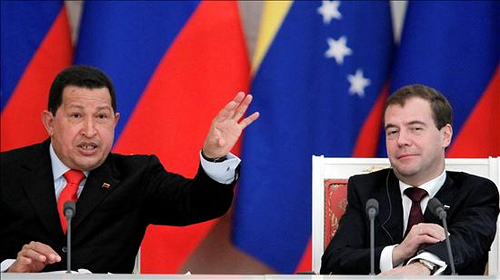Russia and Venezuela have maintained a close commercial relationship since 2005: the South American country has invested over $US 4 billion in Russian armament in the last few years. President Hugo Chavez, who is on a tour throughout Europe and Asia, arrived in Russia (the ninth visit he makes to this country) last October 14 and met with his counterpart Dmitry Medvedev. During their meeting, Chavez and Medvédev signed an “action plan” on different subjects: financial sector, hydrocarbons, armament sales (35 tanks T-72 y T-90), agriculture, telecommunications, transportation, culture and atomic energy.

Hugo Chávez amd Dmitriy Medvedev. Image by flickr user Globovisión, used under an Attribution-NonCommercial 2.0 Generic Creative Commons license
The expectations generated by his visit were met with a deal to build an atomic facility of 500 megawatts. The building of the site would take about 10 years. Venezuela is the first Latin American country to sign an atomic energy deal with Russia.
Reactions to the announcement started emerging at once. The US State Department’s spokesman in the White House, Philip Crowley said, “This is something that we will watch… very, very closely.”
Twitter user William R. Tellechea (@twiwilliamramon) wrote:
ya los gringos empezaron a chillar porque ahora vamos a usar energia nuclear, respeten, somos un país soberano, socialista, “viva Chavez”
The governor of the state of Miranda, Henrique Capriles Radonski [es] criticized, “They talk about nuclear plants when there are over 3 million children excluded from the school system, 58% of children in primary education do not finish ninth grade and only a 5% finish the diversified cycle. That reality must be changed by all of us, I am an instrument, but without you we cannot change that reality.”
Venezuela is going through the worst electric energy crisis of its history, blackouts are common in the inner country, raising discontent among the population. Twitter user Miguel Angel Nieto (@miguelnieto863) said:
Como puede Venezuela Pasar a la era nuclear sino pudo con la era eléctrica? (Misterios de la Revolución)
The permanent Venezuelan representative at the United Nations, Jorge Valero, ratified [es] “That the NPT (Nuclear Non-Proliferation Treaty) does not only seek the elimination of nuclear weapons but also the equal access to nuclear technology for civilian purposes, therefore ‘the Venezuelan Government vindicates the sovereign right of all countries to develop their nuclear industry with peaceful ends’.”
Luís Fernando Angosto analyzes the news in the site aporrea.org [es]:
Aparentemente, cuando se trata de llegar a “ser potencia”, no importa si la vía es la socialista o la capitalista: el ansiado fin justifica los medios. Además, está siendo fácil contar con socios en este tipo de empresa; socios bienintencionados y hasta altruistas que trabajan para que las naciones alcancen su independencia. En este caso, Venezuela tiene a Rusia.
Juan Cristobal from the blog Caracas Chronicles presents “5 reasons to not worry about the nuclear ambitions of Hugo Chavez”:
1. This is a government of incompetents. Recession. Inflation. Collapsing infrastructure. Blackouts. Rotting food containers. Abandoned plans for refineries. The Gasoducto del Sur. Need I say more? The man is a megalomaniac, and the Russians play along with the hope of scoring hefty commissions.
2. No time, no money. […]
3. The government has alienated what little human capital it has. […]
4. Our neighbors are not concerned. There has been no reaction from the Colombian government, and no reaction from the Brazilian government. If they are not worried, why should anyone else be?
5. Hugo Chávez has no political capital left. As was demonstrated in the last Parliamentary election, the majority of Venezuelans reject the Chávez administration. If the elections were held today, he would lose. […]
The construction of the nuclear plant is in its preliminary stage and mounting this kind of infrastructure is not easy for a developing country that has many factors against it: A mounting debt that is growing uncontrollably, a National Assembly where the government does not hold a super majority, and a social deterioration reflected in the 30 homicides per weekend, making Caracas one of the most violent cities in the world. President Chavez will have to analyze how feasible it is to materialize his wishes at this time.







1 comment
Have been enjoying the increase in the amount of Venezuela coverage, thanks to all the GV authors who have added to the discussion.